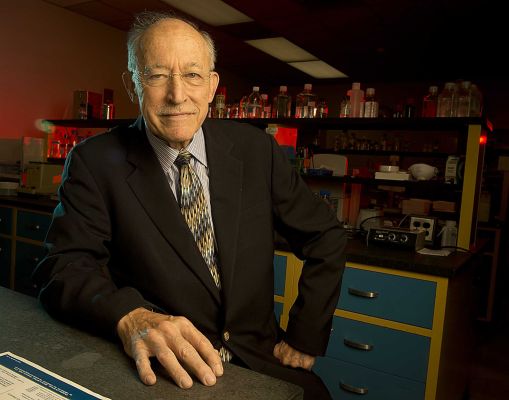Prepared by the Grollman Family
It is with a heavy heart that we announce the passing of Dr. Arthur Grollman, a man whose life was a testament to the pursuit of knowledge and the betterment of humanity. A Renaissance man in every sense, Dr. Grollman’s dedication to justice, science, medical care, and his family was evident in every facet of his remarkable journey.
Dr. Grollman’s academic odyssey commenced with a Bachelor of Arts in Chemistry from the University of California at Berkeley in 1955, followed by a Doctor of Medicine degree from Johns Hopkins University School of Medicine in 1959. His postgraduate years were marked by an internship and residency in Internal Medicine at Hopkins and significant research contributions at the National Institutes of Health.
His illustrious career saw him join the Albert Einstein College of Medicine as Professor of Medicine, Pharmacology, and Molecular Biology, where he also served as Associate Dean for Scientific Affairs. In 1974, he became the Founding Chair of the Department of Pharmacological Sciences at Stony Brook University’s School of Medicine, leading the department to new heights and shaping the future of medical research and education.
Dr. Grollman’s scholarly output was prolific, with over 200 papers that advanced our understanding of molecular biology and cancer research. His work on the biological consequences of DNA damage and the antitumor agent bleomycin was groundbreaking, as were his studies on the three-dimensional structures of DNA enzymes.
A recognized authority on the clinical pharmacology of herbal medicines, Dr. Grollman’s expertise was sought by the White House Commission on Alternative and Complementary Health Policy and Governor George Pataki’s Task Force on Life and Law. His academic influence extended globally, with visiting professorships at prestigious institutions around the world.
In 2003, his contributions were honored with the title of Distinguished Professor of Pharmacological Sciences at Stony Brook. His pioneering work earned him numerous accolades, including an American Cancer Society Scholarship Award and a MERIT award from the National Cancer Institute. The Environmental Mutagen Society recognized his vital research on environmental mutagenesis and his insights into DNA repair mechanisms.
As the world grappled with COVID-19, Dr. Grollman rose to the challenge, dedicating himself to the fight against the pandemic with unwavering commitment.
In 2011, the Environmental Mutagen Society bestowed upon him a prestigious recognition award for his research in environmental mutagenesis, which brought to light the public health crisis of aristolochic acid-induced kidney failure and urothelial cancer. This award also honored his seminal work in elucidating the molecular mechanisms by which DNA repair proteins process oxidative DNA damage.
During the tumultuous times of the COVID-19 pandemic, Dr. Grollman’s indefatigable spirit shone brightly as he led a consortium of top medical and scientific minds from an off-university chemistry lab. Together, they revisited a drug he had worked on in the 1960s—emetine—and studied its effectiveness and toxicity. His dedication persisted until his final days, culminating in the shipment of newly manufactured pills for the first clinical trial against Covid. His team’s research also demonstrated emetine’s efficacy as an antiviral agent against Zika, Ebola, and herpesviruses.
Dr. Grollman’s investigative prowess was pivotal in discovering the cause of Balkan Endemic Nephropathy, a previously fatal kidney disease. His relentless research and collaboration across nations revealed that the herb Aristolochia, intermingled with wheat crops in the Balkans, was the culprit. His findings led to changes in farming and milling methods that halted the disease’s spread. Moreover, he identified the use of this herb in Traditional Chinese Medicine as the cause of Taiwan’s high rate of urothelial cancer, leading to a cessation in its use and a subsequent decline in kidney failure and cancer cases in the region.
An adventurer at heart, Dr. Grollman’s curiosity extended beyond the realms of science and medicine. He traversed all continents except Antarctica, scaling peaks such as Mt. Whitney and Mt. Kilimanjaro, as well as the Alps, the Andes, and Mt. Kellas. His journeys took him to Base Camp 3 on Everest and through the Karakoram Mountains, where he and his guide charted a new route. His profound connection with the Himalayas led to a friendship with the Dalai Lama, whom he invited to Stony Brook to receive an honorary degree. Dr. Grollman also established a program at Stony Brook University to support a Tibetan student annually, typically in pursuit of a degree in Public Health.
A champion of justice, Dr. Grollman’s actions consistently reflected his commitment to protecting and supporting those treated unfairly. His leadership and mentorship touched countless lives, leaving an indelible mark on those who had the privilege of knowing him and benefiting from his work. Dr. Grollman’s passing leaves a void in the hearts of many, but his enduring impact on science, medicine, and humanity will forever be cherished and remembered.





